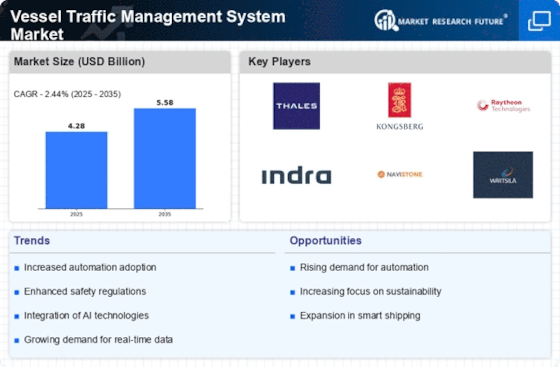Market Share
Vessel Traffic Management System Market Share Analysis
In the competitive landscape of the Vessel Traffic Management System (VTMS) market, market share positioning strategies are crucial for companies to establish a strong presence and gain a competitive edge. One common strategy is differentiation through technological innovation. Companies that invest in cutting-edge technologies, such as advanced radar systems, Artificial Intelligence (AI), and real-time data analytics, can offer more sophisticated and efficient VTMS solutions. By providing features that go beyond basic functionalities, these companies can attract customers looking for state-of-the-art systems, thus securing a higher market share.
Collaboration and strategic partnerships also play a pivotal role in market share positioning. VTMS providers often collaborate with other players in the maritime ecosystem, such as port authorities, shipping companies, and technology vendors. These partnerships can lead to integrated solutions that address specific industry challenges. By aligning with key stakeholders, companies can expand their customer base and enhance the overall value proposition of their VTMS offerings, ultimately capturing a larger share of the market.
Geographical expansion is another strategy employed to strengthen market share positioning. Companies that establish a presence in key maritime regions or emerging markets can tap into new opportunities and broaden their customer reach. Understanding the unique needs and regulatory environments of different regions allows VTMS providers to tailor their solutions accordingly. This localized approach not only facilitates better market penetration but also positions companies as reliable partners capable of addressing specific regional challenges.
Customer-centric strategies contribute significantly to market share positioning. Understanding the needs and preferences of customers allows VTMS providers to tailor their solutions to meet specific requirements. This customer-centric approach builds trust and loyalty, encouraging repeat business and referrals. Additionally, responsive customer support and effective post-implementation services enhance the overall customer experience, contributing to positive word-of-mouth and a favorable market reputation.
Price competitiveness is a critical factor in market share positioning, especially in price-sensitive markets. Some VTMS providers adopt a cost leadership strategy by offering competitive pricing without compromising on quality. This approach aims to capture market share by appealing to customers looking for value for money. However, it requires careful management of operational costs and efficiencies to maintain profitability while offering competitive prices.
Innovation in business models is gaining prominence as a market share positioning strategy. Some companies explore subscription-based models, cloud services, or Software as a Service (SaaS) to provide flexible and cost-effective solutions. This approach aligns with the evolving preferences of customers who may prefer scalable and easily accessible VTMS services. By adapting to changing business models, companies can position themselves as industry leaders and gain a competitive advantage in the market.
Strategic acquisitions and mergers are employed by companies aiming to quickly expand their market share and capabilities. Acquiring established players or merging with complementary businesses allows VTMS providers to consolidate their market position, access new technologies, and leverage the strengths of combined entities. This strategy is particularly effective in rapidly evolving markets where scale and comprehensive offerings are essential for sustained success.


















Leave a Comment